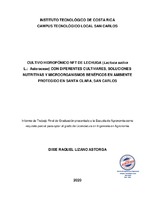Cultivo hidropónico NFT de lechuga (Lactuca sativa L.: Asteraceae) con diferentes cultivares, soluciones nutritivas y microorganismos benéficos en ambiente protegido en Santa Clara, San Carlos
Resumen
En el presente estudio se evaluaron diferentes cultivares de lechuga, soluciones nutritivas y microorganismos benéficos bajo condiciones de ambiente protegido en Santa Clara, San Carlos empleando un sistema hidropónico NFT modificado en forma piramidal, el periodo de evaluación comprendió desde el 14 de marzo hasta el 02 de noviembre del 2019. El trabajo tuvo como objetivo determinar los cultivares de lechuga que presenta mejores características de crecimiento, rendimiento y calidad así como la solución nutritiva y el microrganismo benéfico que confiera mejores características de crecimiento, calidad y rendimiento a los cultivares. El estudio se dividió en tres experimentos sucesivos determinados por los resultados del experimento anterior; para el Experimento 1 se empleó un diseño Completamente al Azar con seis tratamientos con 24 repeticiones; los Experimentos 2 y 3 se analizaron bajo un diseño de Parcelas Divididas en Bloqueo con tres tratamientos y ocho repeticiones. Durante el ciclo de cultivo se realizaron mediciones de altura y número de hojas por planta cada cuatro días, el día de la cosecha se realizaron mediciones en variables de crecimiento vegetativo, rendimiento y calidad. En el Experimento 1 se presentaron diferencias significativas entre tratamientos destacándose los cultivares Sementel y Bohemia con las mejores características comerciales. En el Experimento 2 se presentaron diferencias significativas para algunos de los factores e interacciones entre soluciones nutritivas y cultivar destacándose la SN de Hoagland y Arnon respecto a variables de altura de la planta y peso fresco aéreo. En el Experimento 3 se obtuvieron diferencias estadísticas para las variables de peso fresco de raíz, peso fresco aéreo y etiolación con el uso del MB Trichoderma harzianum presentando los mejores resultados para estas variables de crecimiento, rendimiento y calidad. The presented study evaluated different lettuce cultivars, nutritive solutions and beneficial microorganisms under controlled conditions in Santa Clara, San Carlos implementing an NFT hydroponic system modified in pyramid form. Evaluation time took place from March 14th through November 2nd, 2019. The purpose of the study was to determine which cultivars of lettuce that have better growth, yield and quality characteristics, as well as the nutritive solution and the beneficial microorganism that confers better characteristics growth, quality and yield to the cultivars. The study was divided into three successive experiments determined by the results of the previous experiment; in Experiment 1 a Completely Random design was used with six treatments with 24 repetitions; Experiments 2 and 3 were analyzed under a design of Split Plots in Blockade with three treatments and eight repetitions. Measurements were taken during the crops cycles every four days to determine the height and the number of leaves yielded per plant. On the day of harvest, measurements were taken of vegetative growth, yield and quality. In Experiment 1 were determinate significant differences between treatments, highlighting the Sementel and Bohemia cultivars with the best commercial characteristics. In Experiment 2, significant differences were presented for some of the factors and interactions between nutritive solutions and cultivation, highlighting the Hoagland and Arnon SN regarding variables of plant height and aerial fresh weight. In Experiment 3, statistical differences were obtained for the variables of fresh root weight, fresh air weight and ethiolation with the use of MB Trichoderma harzianum, presenting the best results for these variables of growth, yield and quality.
Descripción
Proyecto de Graduación (Licenciatura en Ingeniería en Agronomía) Instituto Tecnológico de Costa Rica. Escuela de Ingeniería en Agronomía, 2020.


